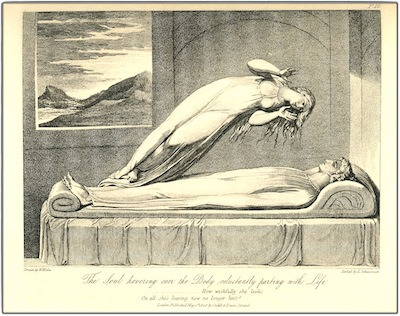Here’s Part 2:
“Whatever you do, don’t make an emotional decision!” How many times have you heard that advice? It sounds wise. After all, how many stories do we know of people who followed their emotions right off a cliff? We know of people who lost everything following anger or lust or greed. In a moment, emotions spike with intensity and you act, often in a ways that are short-sighted, sometimes even self-destructive.
In an effort to protect people from making life-altering bad decisions, parents, teachers, pastors and counselors, have given this advice that has become “common sense.” At best the emotion clouds the issue. At worst, it will lead you in the wrong decision. And if you’re a Christian, it’s sure to lead you into sin.
Turns out none of this is true.
Dualistic Baggage

This perspective is all left-over baggage from the Greek philosophical heritage of western culture.
Greek philosophers taught that humanity, even the world, was made of up two separate parts. Matter and Spirit. Matter was the stuff we could see and feel. It was the earth. It was our bodies. It was weak, distracting, and even evil. Spirit was the stuff we couldn’t see. It was our souls, and the invisible framework behind the universe, the logos. This is the core of ancient Greek dualism. It shaped philosophers and thinkers for the next millennia.
When the Christian church grew beyond its Hebrew roots into a trans-national, trans-ethnic community, theologians were quick to grasp onto the intellectual tools of the more cosmopolitan Greeks. But as is always the case with any cultural translation, something was lost.
Today people, both Christians and non-Christians, largely think that the Biblical view of humanity is dualistic. We have bodies and souls. Our body is our flesh. It’s biological. It’s a vehicle our soul uses for the duration of this life. When this life is over we shed the body and our true nature, our soul, is freed. But this is not the earlier Hebrew view and it’s surprisingly not what the Bible teaches.
A Detour in Creation
In the Genesis story of beginnings, God created humanity this way. God formed humanity from the dust (human, from the word humus, which means dirt), and breathed into them the breath of life. At that point, the text says, man “became a living soul.” That’s Genesis 2:7, Well, in the old KJV. The Hebrew word is nephesh. It does mean soul, but when we read that word we’re hearing the meaning through a couple thousand years of dualistic Greek philosophy.
In the Hebrew, this word essentially meant “being” or “self.” The current NIV, for example, recognizes this and translates the phrase, “man became a living being.” A literal Hebrew reading could be, “the human became a self.”

So, why this detour through Genesis 2:7? What you think about your emotions has a lot to do with this verse and Greek dualism. Greek Philosophers located the emotions in the body, the fleshly part of us. And that meant they were bad. The church took up this view and has marched on ever since.
Your soul is the good part of you, made by God and waiting to break the bonds of flesh and sin. Your body is the sweaty, lust-filled, bad part of you, and it must be subjugated, disciplined, and where that fails, simply ignored. Sound extreme? There are a few centuries of medieval self-flagellation, another century or two of misguided puritanical preaching, and the “common sense” of countless mothers and pastors represented in that sentence. The result is a perspective that reason is more lofty, and more likely to guide us well. Emotions are base and not to be trusted.
But the Hebrew and Biblical view is not dualism. God created humans as single unified beings. He made a body for them from the earth, He breathed into them life, and when these two things came together, the human became a living self. Your body plus God’s gift of life equals a soul. You don’t have a soul; you are a soul. That means that emotions can’t be segregated off into one part of you. Surely emotions have to do with your glands and your body, but your body is a part of who God made you to be, and God declared it good when he made it.
The interesting thing is that this ancient theology is now being mirrored by people who study the body and the brain. For many years neurologists have studied the brain as a black box, something separate from the body. It was almost like they believed that if you could keep the brain alive in a jar, you would still have essential human awareness. But neurobiologists today are telling a different story – that the brain and the body are intricately, intimately connected. The web of nerves conveying electrical impulses, the network of blood flow carrying various chemicals and hormones, all of this is part and parcel of the brain and body. Without the brain, the human body couldn’t be what it is. Without the body, there could be no brain. So cutting edge researchers who used to study the brain exclusively, are now pursuing their study of the brain as a part of a larger context.
The Half-Right Myth
God created you – body, mind, spirit – and all of it was created in God’s image. That means your emotions are made in God’s image as well. And it also means that your emotions were created with a purpose. They exist to move you.
So, the old myth is half right. Emotions do lead you. But where they lead you isn’t always to destruction. Just as you can think of stories where emotion led people astray, you can also think of stories where emotion led people into very good things. It was an emotional decision to propose to my wife. It was an emotional decision to adopt our second child. You have your own examples. When someone dives into a river to save a drowning person, that’s an emotional decision.
Emotions can also lead you into Godly heroics. Those same pastors who were warning us growing up not to follow our “urges,” were telling us to obey the guidance of the Holy Spirit. Well, what does that feel like? It feels like an “ought” that’s heavy on our hearts, essentially an urge to do right. That holy urge even has a name among the old-school charismatics. The Unction. That’s when God moves on your heart – and it’s not rational. The unction has been a powerful force in the world. It’s more powerful than doing what’s right as a duty, or because you’ve done the profit/loss calculation. It’s more powerful than doing something because it’s what the Bible says, even when the words of the Bible underlay the decision and guide it.
Missionaries who pack their families off to remote lands on the hope that they might do some good, counselors who give their lives to working with the mentally ill and addicted, families who take in foster children despite the high emotional cost and risk, people who face down inner pain and approach someone who victimized them offering forgiveness, these are all acts that require passion, and sense of “ought” that’s deeper than a duty. Even Jesus shows us this. In the garden, he had a decision to make about what was going to happen next. Did he do the right thing? Sure. Did he do his duty? Absolutely. But Hebrews 12:2 says that Jesus endured the cross for an emotional reason too: “for the joy set before him.” He had a real emotional reaction to the good that he would do by making his sacrifice, and even though he felt other painful emotions anticipating the pain and loss, it was remembering this joy that in part motivated him forward.
God gave you your emotions. They are as important in your life as your reason. In fact, people who study cognition are saying that you can’t really have good decision making without both. (More on that amazing find later.) Emotions are purposeful. They are meant to move us, push us toward action. The can move us toward sin. But they can also move us towards sacrifice, towards generosity, towards righteousness.
This post is Part 2 of a 5 part series:

I agree. I lived with a practical non emotional mindset for several years. My husband was emotional. In Christian counseling our problems weren’t helped because I was told how women are emotional so I needed to try and see his arguments as being rational, which had us completely backwards. Also, I was told I should “have sex with him whether I feel like it or not. Love is a choice, not a feeling. After all, how would you feel if your husband quit talking to you? Sex is important to men and women withhold it to manipulate men so we should never do that. ” Now I know love is a feeling. Never make your self have sex with someone. ever. If there is a problem that is unresolved that affects your emotional security and you can’t communicate your feelings because they are irrational its not manipulative to withwithhold sex. I was more rational in planning How to spend finances and should be respected for my talents And allowed and encouraged to move in the gifts God has given me And I should act that way to others. Because we were stereotyped and our counseling was based on assumption such as he wasn’t withholding communication when he was it didn’t work out. I had to call the cops on him for a fit of rage he threw and he hasn’t been back since. I learned self pity, taking offense, just all around taking things too personally is negative.
Wow. That’s a hard journey. I’m sorry you went through that. Learning to untangle our beliefs about emotions and reason, and learning who we really are, is a part of maturing, I think.
I’m going to toss my observations in here (respectfully) in response to this thoughtfully written essay.
Absolutely, the Lord God Almighty has emotions. Emotions are not bad in and of themselves. Emotions exist as part of us and are God-given.
That said, emotions do not at any time make any “decisions” for good or ill. The mind and the will are the tools of decision making, and the emotions that accompany those decisions run the full gamut and must be made to submit to the will. Consider our beloved Jesus in Gethsemane:
“Father, if you are willing, take this cup from me; yet not my will, but yours be done.” An angel from heaven appeared to him and strengthened him. And being in anguish, he prayed more earnestly, and his sweat was like drops of blood falling to the ground.” Luke 22:42-44 NIV
Think about this: Jesus’ emotions begged him for deliverance from what was coming, but He made the “love” decision to obey in spite the emotional and psychological grip of fear and dread that was upon Him, and because of that, the Father sent an angel to strengthen Him and encourage Him.
With His mind and His will, Jesus overruled the demands of His emotion at that time. Because of that, He won victory for us and for Himself. Jesus was and is forever both fully God and fully man. To be fully man means that He, at that moment, could have let Himself be ruled by fear. But he did not “obey” His dreadful feelings. He made a choice to believe no matter what and was sustained.
Some of the worst decisions– absolutely disastrous decisions, I have ever made were heavily influenced by powerful emotions that I submitted my decision making rights to. I believe that without the discipline of wisdom and self control granted by the Holy Spirit influencing our intellect and prayer, the “instruction” of emotions can utterly destroy us.
Boiled down to their essence, I am convinced that emotions are our natural responses to any kind of stimuli, something external, something physical, and/or something internal– often supernatural as by the prompting of the Spirit. But I stand firm in my conviction that emotion or feelings on their own are not a good basis for decision making.
There are many things at this point in my life that the Lord is stripping away from me. Part of those removals have occurred because of the natural process of the changing circumstances of this life– my emotional reaction over these changes has, at times, been heart rending and terrifyingly overwhelming. If I obeyed these powerful feelings, I could easily, oh so VERY easily, turn to something destructive to control them, to make myself “feel” better instantly. You can be sure, it is by His power alone that I am made able to cut those cords of counterfeit relief. My emotions, my pride, scream with terror at each relinquishment, begging me not to do it, but by the power of the Holy Spirit, I use my mind and my will and I do it anyway.
Like our brother, Paul, a true Believer, I am experiencing the discipline of training my whole being to obey and “run the race” so as not to be ashamed. When I need relief, He provides it. All things from His hand alone. My emotional state and sense well-being belongs to Him.
I understand your reticence to see emotion as a God-given gift capable of carrying truth, but I respectfully disagree. Our emotions are a well-designed part of who we are that serves much like the dials and alerts on the dashboard of our car. When properly understood these indicators carry important data that we need to make good decisions in our lives. I argue that this is in fact God’s purpose for them.
If you’re interested in both the Biblical and psychological background on this, you might be interested in my book, The Wisdom of Your Heart.